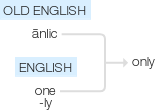Only
Old English ānlic (adjective) (see one, -ly1).
wiktionary
From Middle English oonly, onli, onlych, onelich, anely, from Old English ānlīċ, ǣnlīċ(“like; similar; equal”), from Proto-Germanic *ainalīkaz, equivalent to one + -ly. Cognate with obsolete Dutch eenlijk, German ähnlich(“similar”), Old Norse álíkr, Swedish enlig(“unified”). Regarding the different phonological development of only and one, see the note in one.
etymonline
only (adj.)
"single as regards number, class, or kind," Middle English onli, from Old English ænlic, anlic "only, unique, solitary," literally "one-like," from an "one" (see one) + -lic "-like" (see -ly (1)). Similar formation in Old Frisian einlik, Dutch eenlijk, Old High German einlih, Danish einlig. It preserves the old pronunciation of one. Related: Onliness.
Its use as an adverb ("alone, no other or others than; in but one manner; for but one purpose") and conjunction ("but, except") developed in Middle English. Distinction of only and alone (now usually in reference to emotional states) is unusual; in many languages the same word serves for both. German also has a distinction in allein/einzig. Phrase only-begotten (mid-15c.) is biblical, translating Latin unigenitus, Greek monogenes; the Old English word was ancenned. Only child is attested by 1700.
